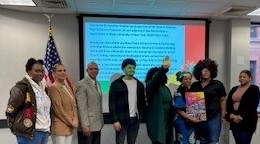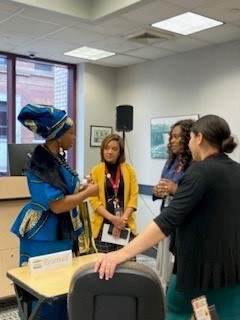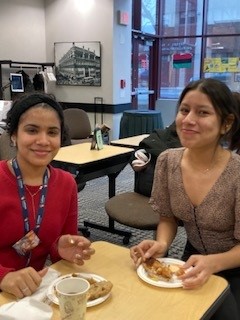Black History Month Opening Reception Features Poet Laureate of Paterson

Black History Month 2024 at PCCC spotlights African Americans in the Arts, and the opening reception on February 1 got off to a poetic start with special guest Talena Lachelle Queen, the first official Poet Laureate of the City of Paterson and an active advocate for arts literacy.
A published poet and in-demand presenter at cultural events, Ms. Queen is the founder and Executive Director of the Paterson Poetry Festival. She is also the founder and president of Word Seed, Inc. a team of literary artists who organize community outreach programs.
The audience in the Paterson Room listened intently as Ms. Queen, dressed in vibrant African attire, described the experiences of African Americans in the arts, most of whom encountered barriers, and not only overcame them, but also transformed the genres they worked in.
“Alvin Ailey changed dance forever,” declared Ms. Queen, referring to the 20th-century dancer/choreographer who defied classical dance stereotypes of his era and created a new path for black dancers.
“He didn’t go home and sulk,” about Ailey’s rejections by the all-white dance troupes of his time. “Instead, he turned classical dance on its head, by creating his own dance company with Black dancers and choreographing dances to Negro spirituals.” Today, the Alvin Ailey American Dance Theater, based in New York City, is one of the foremost professional dance companies in the world.
Explaining the impact of slavery on African American culture, Ms. Queen pointed out that enslaved artists were denied access to the typical ways that artists could portray and preserve their history, but they devised secret solutions, such as sewing information into the pattern of a quilt.

Zora Neale Hurston sought to uncover some of that history. A celebrated writer of the Harlem Renaissance, Hurston was also an anthropologist and filmmaker who traveled the country collecting and recording the actual stories of people who had lived in enslavement. “Those stories are now preserved in the Library of Congress, and you can still hear them there,” said Ms. Queen.
She hailed painter Jean-Michel Basquiat as a “groundbreaking artist who changed the way we see art.” Known for painting large expressionistic murals with scenes of racism and oppression, Basquiat “depicted black people in ways that had not been seen before in art,” Ms. Queen explained. “He elevated what had been called graffiti into a respected art form.”
A highlight of the event was Ms. Queen’s readings of her own poetry. In the poignant “How Do I Tell Them,” a mother calls out to Langston Hughes, Dr. Martin Luther King, and other iconic Black figures, asking how she should tell her young children, in their innocence, about the harsh realities of racism. One line of the poem asks, “Do I tell them, Randall, in bedtime stories: “Once upon a time there was a bombing in Alabama…”

With a fierce dramatic delivery, Ms. Queen read “Ain’t Nobody Got No Time,” a cry of the heart from an angry and disillusioned speaker who dismisses “love poems,” as a waste of time while demanding that “Somebody gotta write ‘bout blood and bullets and pain and poverty Somebody gotta write ‘bout real racism.” In the end, the speaker of the poem realizes that love is what drives the writing of all poetry- and of all creation – in the first place.
The event was organized and hosted by the Center for Student Engagement (CSE), the Student Government Association(SGA), and the Black History and Culture Club(BHCC). At the close of the program, the BHCC presented Ms. Queen with the gift of a 2024 Harlem Renaissance calendar featuring paintings and other artworks credited to Black artists.


 Back to News
Back to News